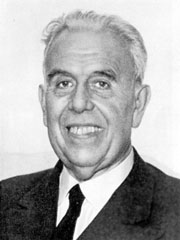Loading AI tools
From Wikipedia, the free encyclopedia
Edmond Privat (17 August 1889 – 28 August 1962) was a Francophone Swiss Esperantist. A historian, university professor, author, journalist and peace activist, he was a graduate of the University of Geneva and a lecturer for the World Peace Foundation.[1] His collective works consist of original dramas, poems, stories, textbooks and books about the Esperanto movement.

Having already learned Esperanto in childhood, Privat and fellow student Hector Hodler founded in 1903 the journal Juna Esperantisto (The Young Esperantist). Though still an adolescent in 1905, he walked 600 kilometres to participate in the first World Congress of Esperanto in Boulogne-sur-Mer, France, where he spoke with mature eloquence.[2]
At the 1907 International Socialist Congress, Privat advocated the use of Esperanto by the International Socialist Bureau in Brussels.[3] Privat served as a committee member of the World Esperanto Association (in Esperanto "UEA: Universala Esperanto-Asocio") beginning in 1912. From 1920 until 1934, he was editor-in-chief of Esperanto's eponymous official magazine. From 1924 until 1938 he was president of the UEA[4] and at the same time president of the International Central Committee. He resigned after a scandal. Privat advanced the international Esperanto organization inside and outside UEA.
His works History of the Esperanto language (in two volumes) and The Life of Zamenhof made him one of the most important historians of Esperanto. As the first historian of Esperanto and Zamenhof's first biographer, he used his connections within Swiss academia to further Esperanto. He authored a linguistic study Esprimo de sentoj en Esperanto (Expression of feelings in Esperanto), is the author of the lyrical Ginevra and of the poem anthology Tra l'silento (Through the Silence).[5] Also, he wrote books teaching Esperanto, Karlo and Course Reader.
During the years 1923–1926, Privat was a vice-delegate of Iran at the League of Nations.[6] He presented Esperanto at the League of Nations, at the International Labour Organization (ILO) and at the Universal Telegraph Union. He was a brilliant organizer, and arranged many international conferences about Esperanto instruction in Geneva (1922). He became a Quaker in 1936. He was a very spiritual person with a wide open heart to the Unity of Religions, as we can see in one of his best books "Sagesse de l'Orient au dela des Religions", published around 1945, where we take us in a tour around the different religions and spiritual movements, ending with his appreciation of Gandhi.
Seamless Wikipedia browsing. On steroids.
Every time you click a link to Wikipedia, Wiktionary or Wikiquote in your browser's search results, it will show the modern Wikiwand interface.
Wikiwand extension is a five stars, simple, with minimum permission required to keep your browsing private, safe and transparent.